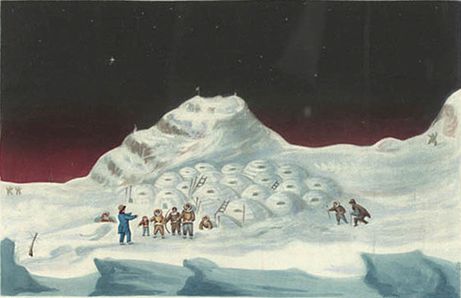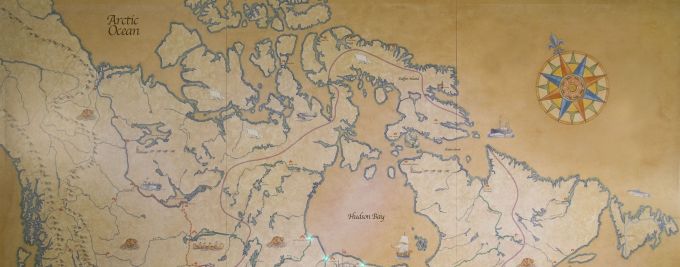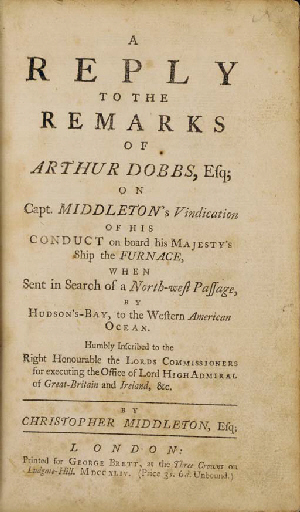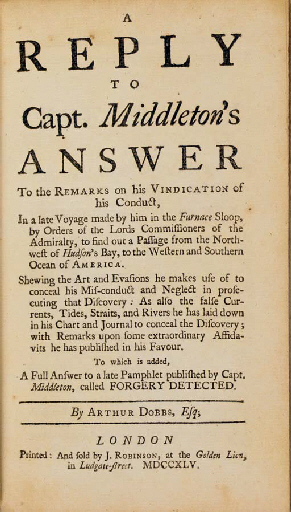Nothing can be as fascinating in the world of exploration and discovery as some of the early Arctic voyages. Still one of the last frontiers on earth, the region that spans the Arctic Ocean and covers land areas in parts of Canada, Greenland, Iceland, Norway, Russia, and the United States (Alaska), has attracted numerous explorers whose journeys are documented in various journals and accounts. One of my favorite exploration adventures is the search for the Northwest Passage, specifically what is referred to as the Dobbs-Middleton controversy.
In order to grasp the essence of the Dobbs-Middleton dispute, a bit of a background historical information is necessary, beginning with the Russians who had forced their way to the east of Siberia and discovered Alaska in 1648. One of the consequences of the Russian advancement was believed to be the formation of the Hudson Bay Company by the British American colonies in 1670. Listed in the fur trade business, the company spent more energy exploring the possibility of a north-west passage to India and China from the western outlet of the Hudson Bay. In May of 1741, after some unsuccessful voyages of discovery, two ships, the Furnace Bomb and the Discovery Pink, left England with Irish engineer-in-chief and surveyor-general, Arthur Dobbs’s abstracts containing all voyages’ information known to him at the time. Dobbs, who did not travel with the expedition, selected Hudson Bay’s Captain Christopher Middleton to be the commander of the expedition. They ascended as far as 88° west Greenwich, examining all openings, but they were stopped by the ice at Repulse Bay, turning back on September 1742. Middleton reported that the only openings seen between the 65 and the 66 parallels of north latitude were from large rivers. Dobbs accused Middleton of making false statements and brought the matter before Admiral Sir Charles Wager.
For collectors of the “Exploration & Travel” genre, the Dobbs-Middleton dispute produced a number of collectible items. Middleton’s “Vindication of the Conduct of Captain Christopher Middleton” (London, 1743) was followed by “Remarks on Capt. Middleton’s Defence by A. Dobbs” (London, 1744), which was re-battled by Middleton’s “A Rejoinder” (London, 1745). Despite containing extensive controversial portions, some of the accounts contain much valuable and interesting information regarding the physical geography of the area.
Thomas W. Streeter, Sr. (1883-1965), the greatest Americana book collector of the 20th century, and his son Frank Sherwin Streeter, collected among other treasures the pamphlets around the Dobbs-Middleton controversy. Some of the pamphlets in this fierce dispute of words have long been regarded as the black tulips of early Arctic voyages, and were sold by Christie’s New York on April 16-17, 2007 as part of an event titled “The Frank S. Streeter Library: Important Navigation, Pacific Voyages, Cartography, Science.” Among them, “Dobbs, Arthur. A Reply to Capt. Middleton’s Answer to the Remarks on his Vindication of his Conduct… London: J. Robinson, 1745,” sold for $31,200. It was estimated at a mere $4,000-$6,000. Seven more lots attracted similar enthusiasm from bidders.
This September, Sotheby’s is holding the second part of its Exploration and Discovery 1576-1939: The Library of Franklin Brooke-Hitching, featuring authors D-J. Franklin Brooke-Hitching who assembled the finest private collection of English language books relating to voyages, exploration and discovery from 16th century to the 1930s. This second part includes a collection of seven works in 3 volumes dated 1743-45 on the Dobbs-Middleton controversy. Estimate: £60,000-90,000. If part 1 is any indication of things to come, the lot could easily break through the high estimate.
An interesting part of this literature pertaining to the dispute had to do with the activities of the Russians in the Siberian Arctic with their own explorations of the Northern Pacific under Vitus Bering, the exploration of Bering Strait, Bering’s discovery of Alaska, and the Russian occupation of that northern tip of the continent. Russian advancement had important implications to the nature of the motives behind the dispute that ultimately led to such collectible writings.





{ 0 comments… add one now }